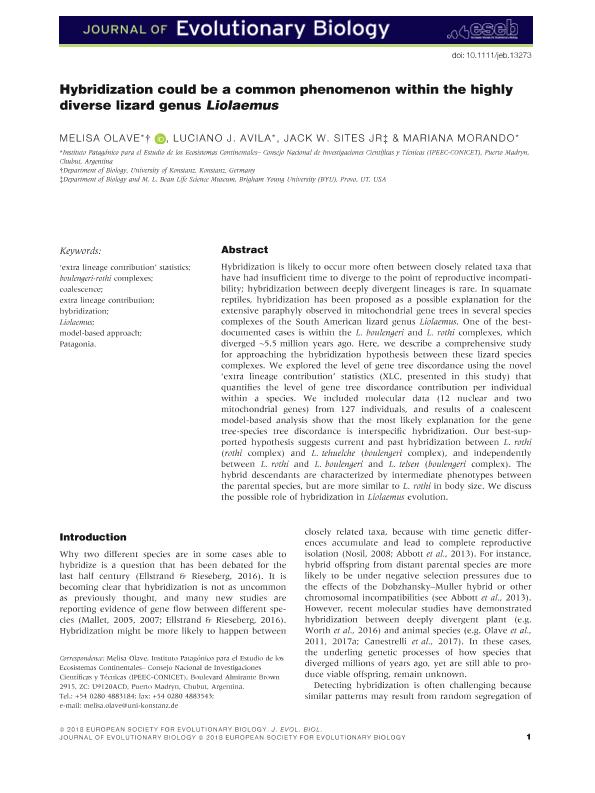Artículo
Hybridization could be a common phenomenon within the highly diverse lizard genus Liolaemus
Fecha de publicación:
06/2018
Editorial:
Wiley Blackwell Publishing, Inc
Revista:
Journal of Evolutionary Biology
ISSN:
1010-061X
e-ISSN:
1420-9101
Idioma:
Inglés
Tipo de recurso:
Artículo publicado
Clasificación temática:
Resumen
Hybridization is likely to occur more often between closely related taxa that have had insufficient time to diverge to the point of reproductive incompatibility; hybridization between deeply divergent lineages is rare. In squamate reptiles, hybridization has been proposed as a possible explanation for the extensive paraphyly observed in mitochondrial gene trees in several species complexes of the South American lizard genus Liolaemus. One of the best-documented cases is within the L. boulengeri and L. rothi complexes, which diverged ~5.5 million years ago. Here, we describe a comprehensive study for approaching the hybridization hypothesis between these lizard species complexes. We explored the level of gene tree discordance using the novel ‘extra lineage contribution’ statistics (XLC, presented in this study) that quantifies the level of gene tree discordance contribution per individual within a species. We included molecular data (12 nuclear and two mitochondrial genes) from 127 individuals, and results of a coalescent model-based analysis show that the most likely explanation for the gene tree-species tree discordance is interspecific hybridization. Our best-supported hypothesis suggests current and past hybridization between L. rothi (rothi complex) and L. tehuelche (boulengeri complex), and independently between L. rothi and L. boulengeri and L. telsen (boulengeri complex). The hybrid descendants are characterized by intermediate phenotypes between the parental species, but are more similar to L. rothi in body size. We discuss the possible role of hybridization in Liolaemus evolution.
Archivos asociados
Licencia
Identificadores
Colecciones
Articulos(IPEEC)
Articulos de INSTITUTO PATAGONICO PARA EL ESTUDIO DE LOS ECOSISTEMAS CONTINENTALES
Articulos de INSTITUTO PATAGONICO PARA EL ESTUDIO DE LOS ECOSISTEMAS CONTINENTALES
Citación
Olave, Melisa; Avila, Luciano Javier; Sites, Jack W.; Morando, Mariana; Hybridization could be a common phenomenon within the highly diverse lizard genus Liolaemus; Wiley Blackwell Publishing, Inc; Journal of Evolutionary Biology; 31; 6; 6-2018; 893-903
Compartir
Altmétricas




